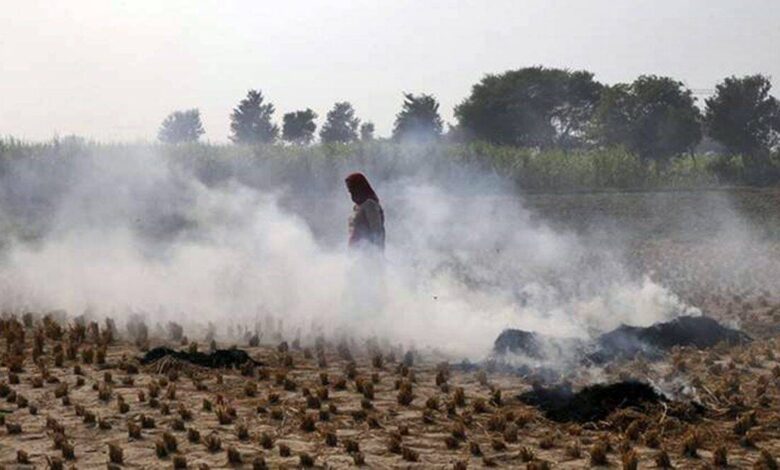Dropping Air Quality: Have the North Indian States failed to curb Stubble burning?

Big blanket of smoke and pollution chokes north India every year. Despite the considerable efforts by both the Union and State governments to curb stubble burning, the slipping air quality shows a grim reality.
The narrow window between the harvesting and sowing season during October and November is a challenging time every year. Farmers across Punjab and Haryana burn stubble of paddy as a quick method of clearing the vast fields.
This large-scale burning of paddy residue along with falling temperatures and decreased wind speed shoots up air pollution in North India.
This annual phenomenon significantly contributes to Air pollution. Air quality degrades rapidly with over 20-70% increase in air pollution due to stubble burning in the landlocked National Capital.
States are continuously making efforts to do away with this huge challenge The State governments of Punjab and Haryana have taken measures to incentivize farmers to discontinue this traditional practice,
Efforts by the Centre to control stubble burning
The National Policy for Management of Crop Residue for states under the Union Agriculture ministry laid the objectives for stubble management using technology. However, the Energy and Resources Institute has highlighted the lack of effective methods under this initiative.
Around the same time last year, the Supreme Court issued directives to the Northern states of Punjab, Haryana, and Uttar Pradesh government to devise systematic plans to prevent stubble burning and compensate by providing incentives.
Later the Union government introduced the Commission for Air Quality Management in the National Capital Region and Adjoining Areas Act, this year.
Through this Act, the Centre monitors air quality in and around areas circling Delhi. Since its inception, the commission has held several meetings and provided guidelines to the state governments.
The commission in a statement said that there are over 1 lakh machines to process the stubble on the fields. It is also attempting to procure approximately 56,000 more machines.
A piece of innovative machinery developed by the Indian Agricultural Institute called the Bio-decomposer or Pusa decomposer is deployed on fields stretching across six lakh acres in Uttar Pradesh. Followed by one lakh in Haryana and 4,000 acres in Delhi.
The statement added that 11 thermal power plants in Delhi along the proximity of 300kms use paddy residue as fuel.
Punjab made effort on the following fronts
The state of Punjab accounts for the maximum yearly crop fires. Therefore to counter this humongous challenge, it has put toward several initiatives.
The state generates a whopping 20 million tonnes of paddy straw for a period of 55 days. Given the limited time to clear off the lands, the government has to deploy systematic storage and supply chains.
Punjab plans to make panchayat lands as a storage ground for paddy straw. leased out to industries for 33 years with rent.
The government has also provided for in-situ management of paddy residue. 71,000 crop shredding machines have been provided to farmers which can manage one-third of the residue.
However, these machines are not financially viable for small farmers as they cost over 2 lakh rupees. Therefore the government provides a huge subsidy of 80% on such machines to farmers groups and state cooperative societies. It also offers subsidies to individual farmers at 50%.
The private sector has also entered the scenario with companies creating schemes worth rs 25 scores in industries like paper mill sugar mill to use paddy residue as fuel
Despite all these initiatives, it is not clear how effective they actually are. And it also depends on how strictly the enforcement is without any laxity.
Other states followed policies on similar lines
The Haryana government deployed nodal officers to monitor the incidences of burning.
In Delhi, the government resorted to the Bio-decomposer or Pusa decomposer developed by IARI
However, experts are not much impressed by these efforts by the various State governments. They believe tremendous work can bring such cases to net zero. The emphasis is that the long-term approach such as crop diversification is much more effective at tackling this challenge.
Impact of farmers protests on stubble burning
Farmers from the north Indian states have been engaged in a bitter protest against the Centre’s Farm Bills for over a year now.
Some incidences of increase in the cases of farm fire incidents are linked to farmers’ agitation over farm laws.
States have imposed heavy challans or fines on crop fires. However, it seems unfair to penalize farmers as many of them lack awareness.
The Punjab Pollution Control Board revealed the incidences were more the area burnt was less than 5% last year.
Read more at: https://akashbaani.com/world-unity-day-as-sardar-vallabhbhai-patels-birth-anniversary/



